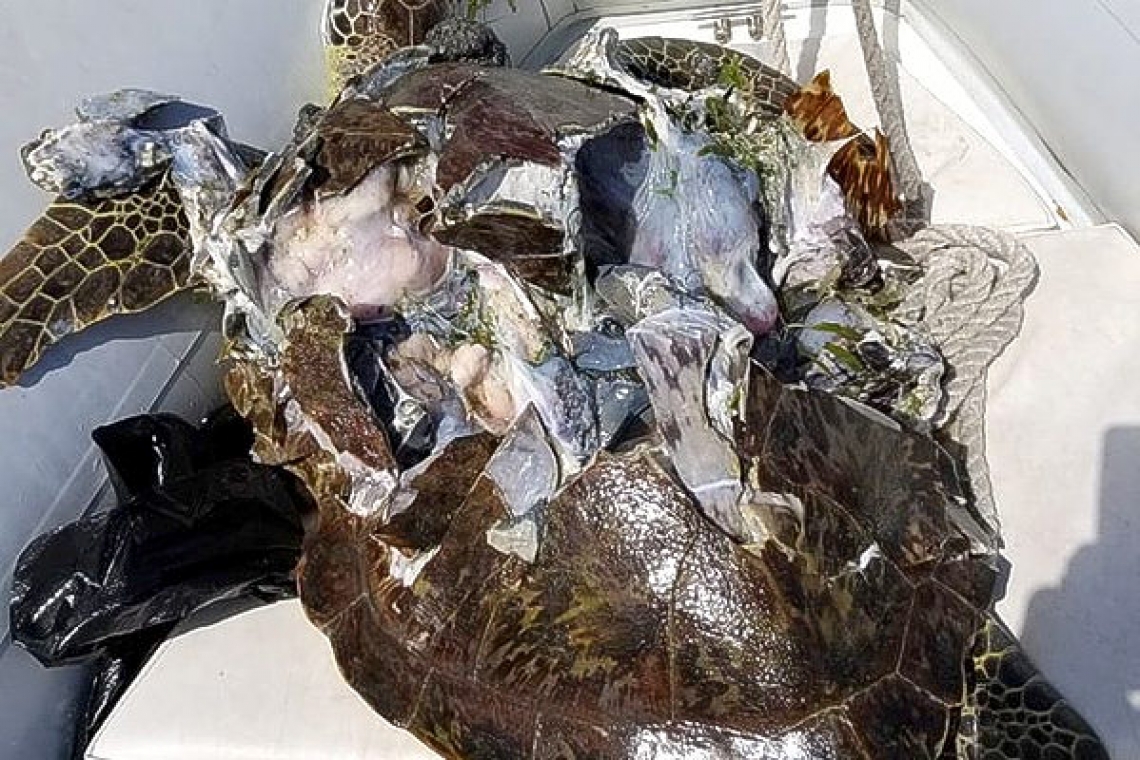A green sea turtle that was killed in a boat strike.
PHILIPSBURG--Sea turtles around St. Maarten are experiencing declines in nesting rates and an increase in deaths, according to St. Maarten Nature Foundation.
According to the foundation, the 2019 sea turtle nesting season saw an increase in green turtle, leatherback sea turtle and hawksbill sea turtle nests compared to the last three years. The turtles had built nests on Mullet Bay Beach, Dawn Beach, and Guana Bay Beach, as well as at Simpson Bay and Gibbs Bay. However, the numbers of nests per season are much lower than compared to 10 years ago, said the foundation.
The foundation also said sea turtles experience serious threats to their survival, as several turtles died last year due to boat strikes, beach destruction and garbage.
“Last year we reported several dead sea turtles. Five of them died due to boat strikes in and around the Simpson Bay Lagoon area. Two died because of trash, ending up entangled in a chair and in fishing gear. Also, an additional amount of sea turtles died on the French side.
“Sea turtles are vulnerable species. When they forage, they need to come up to the surface in order to breath and they need an undisturbed beach to produce a successful nest. Frequent beach driving activities cause sea turtle eggs to be crushed and beach constructions leave no room for sea turtles to nest.
“We are seriously concerned about the survival chances of our sea turtle population and urge increases in, and enforcement of, the protections for our precious sea turtles,” said St. Maarten Nature Foundation Manager Melanie Meijer zu Schlochtern in a press release on Friday.
The Nature Foundation is the designated authority to monitor sea turtle populations and nests in St. Maarten. The foundation said it had increased patrols to assess nesting population trends last year.
“Verified sea turtle nests appear to be scarce in the past years and the hatching success of our nests seems to be very low, indicating disturbances on the beach such as beach driving or habitat destruction. However, extended research and funding is needed to establish significant nesting trends for St. Maarten sea turtles in the coming years,” said Meijer zu Schlochtern.
The foundation took on environmental monitoring student Saskia Werner as an intern in 2019. Her report about sea turtle nesting in St. Maarten has been published on the Nature Foundation website.
The foundation said it is “vigorously” taking measures to decrease sea turtles threats by creating awareness and meeting with stakeholders.
“We are actively working on blocking vehicle access to our beaches, together with the help of the VROMI [Ministry of Public Housing, Spatial Planning, Environment and Infrastructure – Ed.] Department of Infrastructure. Hopefully more beaches will be closed for accidental and intentional beach driving, such as on Kim Sha Beach,” said Meijer zu Schlochtern.
All sea turtle species are protected under Articles 16 and 17 of the Nature Conservation Ordinance St. Maarten.
“Therefore, it is illegal to kill, wound, capture or pick up sea turtles. It is also illegal to directly or indirectly disturb their environment resulting in physical threats or damage, or to commit other acts which result in disturbance of the animal. It is forbidden to disturb, damage or destroy sea turtle nests, lairs or breeding places. Also, it is forbidden, by the same law, to pick up or destroy the eggs of any species of sea turtle.
“Legal action to enforce [this law] can be taken by inspectors of the Ministry of VROMI, in order to investigate and prosecute offenders disturbing or affecting sea turtles or other protected species.
“Recently, the Prosecutor’s Office, after a meeting with the Ministry of VROMI and the Nature Foundation, has expressed interest in taking up the challenge to prosecute criminal offences regarding sea turtles and their nesting habitat,” said the foundation in the press release.
“We have met with the prosecutor to talk about the possibility to enforce the legislation of protective species. The prosecutor is supporting this, so some preparations will be started now between the Ministry of VROMI, Nature Foundation and the Prosecutor’s Office to get this executed,” said VROMI policy advisor on nature and environment Ildiko Gilders.
“On St. Maarten beaches, houses are built on the beach or have been in the past, as we see on Simpson Bay Beach, forcing sea turtles to lay their nests in the danger ‘over wash’ zone of the beach, leading to a lower or no hatching success.
“In addition, large amounts of wastewater, including sewage, are entering the ocean [and] affecting the marine life living in it, especially vulnerable sea turtles. Moreover, sea turtles [that are] nesting are disoriented and disturbed by beach lighting. Hatchlings are often found ‘going the wrong way’ [and] ending up in dangerous places, such as on the boardwalk or on the road, which happened three times in 2018.
“Single-use plastics pollution is also a serious problem in St. Maarten. Trash on the beaches and in the waterways affects the sea turtle population, obstructing their already tough crawls on the beach. Sea turtles are found to be entangled in trash or ingest the harmful products. …
“To ensure sea turtle populations for the future, all residents, tourists and organisations in St. Maarten could assist to be alert and by preventing additional threats to sea turtles,” concluded the Nature Foundation.







